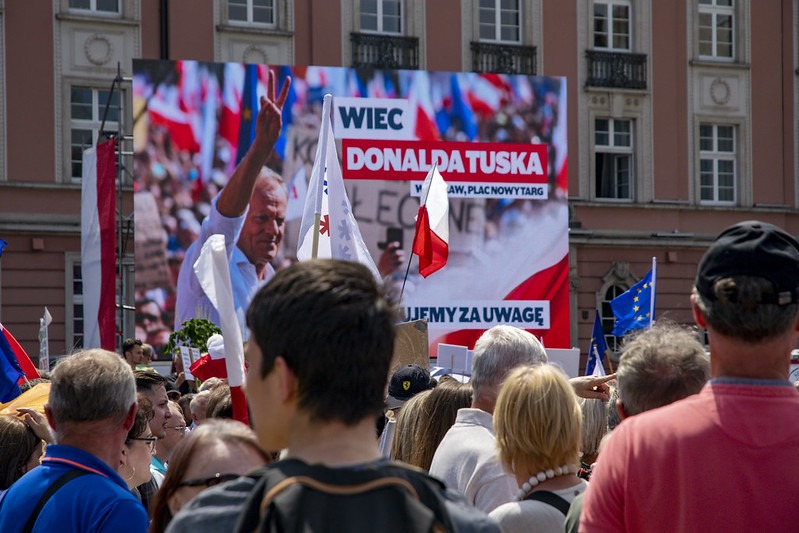Zwycięstwo polskiej opozycji oklaskiwane na Ukrainie, w Rosji i na Białorusi

Let me start with the good news. Over the last few days I’ve received a lot of congratulatory messages from my Ukrainian, Belarusian and Russian friends, following the opposition victory in Poland. My friends in Eastern Europe – especially the Russians and Belarusians – are in awe of the citizen mobilisation, and of the fact that it is possible to change power through elections.
So it may come as a surprise that the mood in Poland is not entirely optimistic. As opposition supporters, no doubt we were emotionally preparing for a win by the conservative, populist and Eurosceptic Law and Justice party (PiS). That’s why it’s hard to rejoice: we can’t yet grasp the changes that this election result implies. Given the scale of social mobilisation reflected in a record turnout, the joy and euphoria are fully deserved, as Paulina Januszewska writes in Krytyka Polityczna. But there are plenty of reasons for concern, as the transfer of power has not yet taken place.
More : Poland’s great democratic moment is good news for all of Europe
No one doubts the intentions of President Duda, who is a party loyalist and who, thanks to his prerogatives, can drag this transfer out for a good two more months, notes Onet. Likewise, PiS is not ready to give up on the matter. It is regrouping its forces and will fight to the bitter end to stay in power. However, the mode of government of Jarosław Kaczyński’s party, based on extreme polarisation and the creation of divisions, means that PiS has no coalition capacity. By Christmas at the latest, Poland should therefore have a new government. It is to be formed by three political forces, each of which represents a coalition of smaller and sometimes very diverse entities. Voters for The Left – who had the worst election result (8.61% of the vote) – are concerned about their prospects for passing progressive policies over the next four years, given that the conservative Polish People’s Party (PSL) is also due a share in government. PSL leader Władysław Kosiniak-Kamysz has said, for example, that he would not support the bill allowing Polish women to have abortions up to the 12th week of pregnancy.
Our doubts about the new government and its ability to pass reforms are therefore justified, as emphasises OKO Press. One thing seems certain, however: Polish society will not forgive this coalition if it fails.
More : As poverty spreads in Europe, wealth is (still) tax-free
In Ukraine, reactions to the outcome of the Polish elections are also positive, albeit more moderate, reports Newsweek Polska. Ukrainian progressives are likely delighted, especially those who have progressive friends in Poland and who were closely following the advance of authoritarianism in our country. Some outlets, such as New Voice, make no secret of their sympathy for Donald Tusk and have high expectations of his overtly pro-Ukrainian rhetoric. Although observers in Ukraine are all hoping for a fresh start in Polish-Ukrainian relations – which have been strained in recent months – they know that good neighbourly relations will require constant efforts, regardless of the government in power in Poland. For Ukraine, this Polish election represents an important event insofar as it affects the two countries’ defence capabilities while Russian aggression continues to claim victims every day.
In a lengthy interview with the exiled independent Russian newspaper Novaya Gazeta Europe, the leader of the Belarusian opposition Sviatlana Tsikhanouskaya has unequivocally dissociated herself not only from Russia and its problems, but also from the Russian opposition. She stresses that Belarusians, unlike most Russians, do not support the war against Ukraine, that imperialist sentiments predominate among Russians and that Vladimir Putin, unlike his Belarusian counterpart Aleksandr Lukashenka, enjoys a form of social and electoral legitimacy. When asked by journalist Ilja Azar about cooperation between the Belarusian and Russian opposition, Tsikhanouskaya retorted that Belarusians have no need for it. Some representatives and supporters of the Russian opposition took offence at Tikhanovskaya’s interview, but others agreed with her.
Belarus is still Belarus, with its own problems, ambitions and priorities. After the fraudulent 2020 elections, the Belarusian opposition has managed to remain coherent and indeed to convince many partners around the world of its political mandate and its right to represent the interests of Belarus. Despite being in exile, it is well-organised and strategically focused. In contrast, the Russian opposition is something of an amorphous creation, made up of a large number of rivalrous factions which regard each other with suspicion. In Russia, opposition politics is turning into a YouTube show, where the personalities with the most subscribers are considered to be the most influential. The conventions and other events organised by the various formal opposition forces have achieved little or nothing for Russians in exile, and even less for Russia’s internal political situation.
And it’s getting worse, as impossible as that may seem. Last week, the Russian authorities arrested three of the lawyers of the imprisoned opposition leader Alexei Navalny. They look set to be charged with involvement in an extremist organisation. According to Navalny’s associates, by arresting his lawyers, the regime wants to deprive him of a defence, but above all it seeks to cut him off from contact with the outside world. It was thanks to his lawyers that Navalny kept abreast of the situation behind prison walls, and it was they who passed on his statements and manifestos, which were then published on his social network channels.



